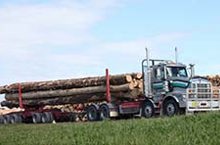
New rules limiting farm to forestry conversions under the Emissions Trading Scheme (ETS) are set to have dire consequences for forest growers in New Zealand and the country’s ability to meet its climate change targets, says the New Zealand Forest Owners Association (FOA).
Announced last week by Forestry Minister Todd McClay, the new rules will see a moratorium placed on exotic forestry registrations for Land Use Classifications (LUC) 1 to 5 and an annual cap set at 15,000 hectares (ha) for exotic forestry registrations on LUC 6 farmland.
FOA Chief Executive, Dr Elizabeth Heeg, says the rules are hurting forest owners who are making some of the biggest contributions to improving New Zealand’s climate outcomes.
“A moratorium on forests able to be planted on LUCs 1 to 5 severely limits the number of forests that can participate in the ETS,” she says. “By pushing the establishment of new forests to marginal or less productive agricultural land, we are not only limiting our country’s capacity to enhance carbon sequestration efforts but also undermining a vital industry that supports thousands of jobs.”
With planting restrictions imposed on LUC 6 too, Dr Heeg says the new rules could significantly reduce the land available for establishing the forests needed to meet the 2050 climate target.
“Planting of trees, be that for production purposes, diversification of land, or for carbon sequestration, is arguably the only real tool at New Zealand’s disposal to mitigate emissions besides gross emissions reductions,” she says.
“These land use restrictions are shortsighted and will only serve to disincentivise forest owners’ participation in the ETS – ultimately leading to reduced planting rates and poor outcomes for our sector and the climate.”
While there has been an increase in the planting of carbon forests in recent years, the total forest estate remains smaller than what it was 20 years ago.
“The misconception that we need to limit farm to forestry conversions to ensure food production is misguided and hurting our forest growers who are an equally important component of New Zealand’s food and fibre network,” she adds.
Small scale woodlot owners and farm foresters stand to be most affected, with the new rules limiting the tools available to diversify their land and offset agricultural emissions.
“Landowners, including farmers having the right to diversify their land through the planting of more trees,” Dr Heeg says. “This announcement essentially devalues farms in that land use will become limited to farming only.
“Only allowing 25% of the farm to be planted also appears to be an arbitrary threshold that may not be appropriate for all farmers.”
She adds that forest owners are concerned that the LUC cut-off was an arbitrary decision rather than an evidence-based one.
“The LUC is a blunt instrument that doesn’t necessarily capture all land areas suited to forestry or other land uses. The sector is not opposed to new rules and regulations; however, these must be evidence based.
“Care must be taken applying blanket rules using tools that lack the granularity required to understand the wide-scale impact that moratoriums such as these may have on industries like ours.
“It is disappointing that production forestry is once again being unfairly persecuted for its climate contributions and landowners wanting to plant trees are being restricted.”
Dr Heeg says forest owners will be seeking further engagement with the Minister on the new rules, to ensure forestry is supported and the gravity of these decisions for forest owners is understood.
“The lack of support for forestry and what the sector is trying to achieve for New Zealand communities is incredibly disappointing.
“The Climate Change Commission has clearly signalled that significantly more planting will be required to meet our 2050 target.
“The government’s announcement is a strong contradiction of the direction New Zealand should be moving in with respect to its climate change policies.”
The new rules will come into force from October 2025.










